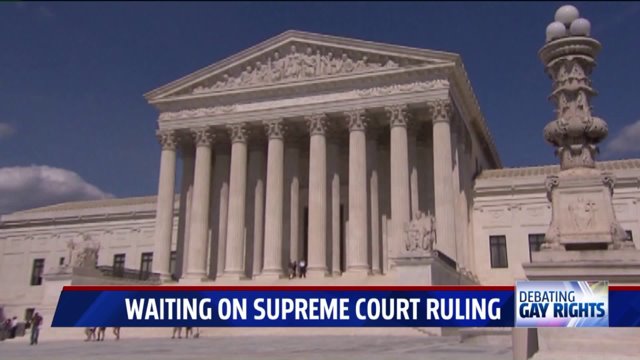WASHINGTON -- It's a historic decision that is expected to come any day now before the end of June.
At the heart of the question that will be answered by the U.S. Supreme Court: Is marriage a fundamental right afforded to everyone, gay or straight, under the 14th Amendment of the U.S. Constitution?
Oral arguments in April revealed a divide among the court's nine justices on the issue.
If the highest court in the land were to rule against same-sex marriage and in favor of upholding the existing bans already in place in several states, including Michigan, Cooley Law School Assistant Dean Tracey Brame said it could wreak legal havoc in what would become an extremely fragmented system.
“What would emanate from that is a somewhat chaotic situation in which you have many states that allow same sex couples to marry--and at least 13 that don’t--so you end up with a patchwork of laws," Brame said.
If and when the Supreme Court ever makes a decision on an issue, there is no further opportunity to appeal it, which means the next logical step if the justices decide against same-sex marriage would be to take the issue back to voters, according to Brame.
“The court could say there’s no Constitutional right to same sex marriage and therefore each state can decide what they want to do," she said. "Then those fighting for same-sex marriage would be left to the ballot box.”
Recent polling commissioned by the Freedom to Marry Coalition suggests a growing majority of Americans now say they expect the Supreme Court to rule in favor of allowing same-sex couples to wed, which Brame said could be a indicative of an ultimate decision.
But Jennifer Judd, director of field operations for Equality Michigan, said taking the issue back to voters is not a favorable alternative option. Judd instead said the LBGT advocacy organization remains optimistic the court will rule in favor of marriage equality.
“We don’t believe that people should be voting on civil rights issues, that’s just not what we believe is a strategy at this point," Judd told FOX 17 by phone.
“We have to keep continuing to fight toward this. It wouldn’t be the first time the Supreme Court got a decision wrong before getting it right and we believe the American people are way ahead of where the majority of Justices are who may get it wrong.”
But even if the court rules in favor of same-sex marriage, Brame said it could still open the door to several other questions. Citing the recent faith-based adoption objection laws passed by Gov. Snyder this week, Brame questioned whether legally married same-sex couples would still face discrimination when trying to adopt.
Same-sex marriages already on the books are likely a safe bet to stay that way, Brame said. Likewise, states already allowing same-sex marriages would likely continue business as usual.
The fate of the 300 or so same-sex couples married in Michigan in 2014 during a brief legal window could possibly face a more uncertain future because a decision from the Supreme Court could a set a precedent for the state to follow instead. Gov. Snyder said in February the state would recognized the marriages.
Meanwhile, Christian leaders across the country are also preparing for the possibility the court strikes down same-sex marriage bans by promising 'civil disobedience.'
“While there are many things we can endure, redefining marriage is so fundamental to the natural order and the common good that this is the line we must draw and one we cannot and will not cross,” according to a pledge from the national Defend Marriage campaign.
Brame said any decision from the Supreme Court will hinge on whether the justices consider marriage to be a fundamental human right.
“Is it like issues related to race discrimination where there’s no room for citizens of any state to vote on it, it’s just wrong," she said. "Or are you going to treat it differently and say it’s not a right permitted in the Constitution, this is something people in the state have the opportunity to decide for themselves and that is historic and that’s what people are waiting for.”
While a decision is expected before the end of the month, it's possible the justices could add days to the session and push a decision back until July.



